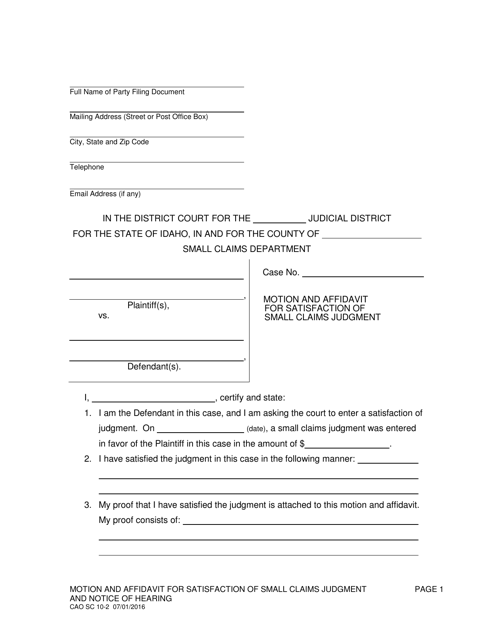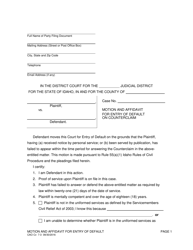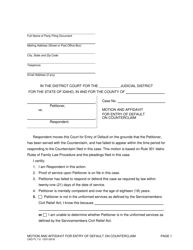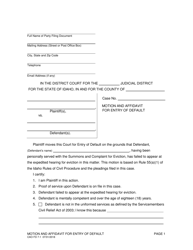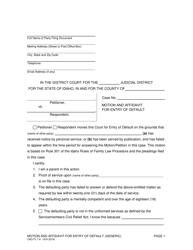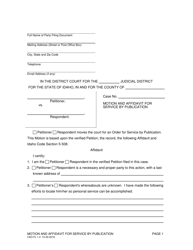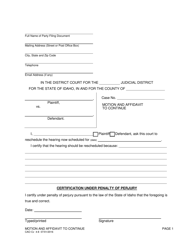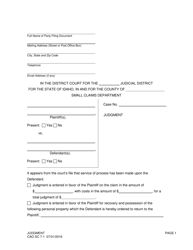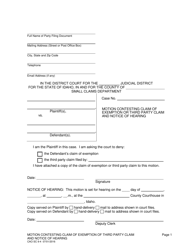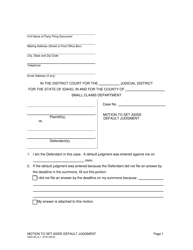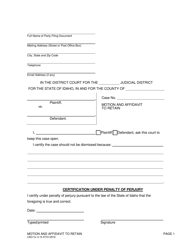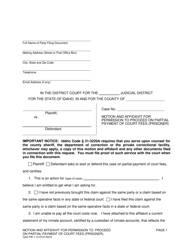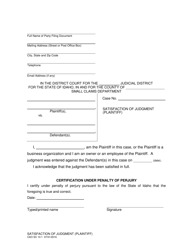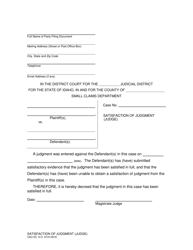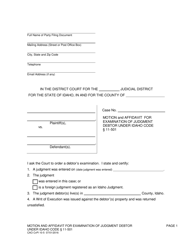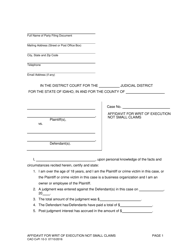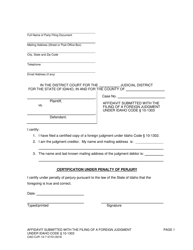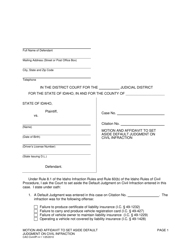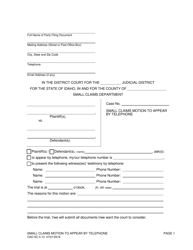Form CAO SC10-2 Motion and Affidavit for Satisfaction of Small Claims Judgment - Idaho
What Is Form CAO SC10-2?
This is a legal form that was released by the Idaho District Courts - a government authority operating within Idaho. As of today, no separate filing guidelines for the form are provided by the issuing department.
FAQ
Q: What is Form CAO SC10-2?
A: Form CAO SC10-2 is a motion and affidavit for satisfaction of small claims judgment in Idaho.
Q: What is small claims judgment?
A: A small claims judgment is a legal decision made in a small claims court.
Q: What is the purpose of Form CAO SC10-2?
A: The purpose of this form is to request satisfaction of a small claims judgment.
Q: Who can use Form CAO SC10-2?
A: Anyone who has obtained a small claims judgment in Idaho can use this form.
Q: What information is required in Form CAO SC10-2?
A: You will need to provide information about the judgment, the judgment debtor, and your contact information.
Q: Are there any fees for filing Form CAO SC10-2?
A: There may be filing fees associated with filing this form. You should check with the Clerk of the Small Claims Division for the exact fee amount.
Q: What happens after filing Form CAO SC10-2?
A: Once the form is filed, the court will review the request for satisfaction of the small claims judgment.
Q: Is legal representation required for filing Form CAO SC10-2?
A: Legal representation is not required, but you may choose to consult with an attorney for assistance.
Q: What if the judgment debtor refuses to pay?
A: If the judgment debtor refuses to pay, you may need to pursue additional legal actions to enforce the judgment.
Q: What should I do if I have questions about Form CAO SC10-2?
A: If you have questions about this form, you should contact the Clerk of the Small Claims Division for clarification.
Q: Are there any time limits for filing Form CAO SC10-2?
A: There may be specific time limits for filing this form. It is important to consult the Idaho courts or an attorney for guidance.
Q: Can I use Form CAO SC10-2 for judgments from other states?
A: No, this form is specifically for satisfaction of small claims judgments in Idaho.
Q: Can the judgment debtor challenge the request for satisfaction of the judgment?
A: Yes, the judgment debtor may have the opportunity to challenge the request. The court will review any objections and make a decision.
Q: What happens if the request for satisfaction is granted?
A: If the request for satisfaction of the small claims judgment is granted, it means that the judgment has been officially satisfied and the debtor is no longer obligated to pay.
Q: What happens if the request for satisfaction is denied?
A: If the request for satisfaction of the small claims judgment is denied, you may need to explore other legal options to collect the judgment.
Q: Can I appeal the decision regarding the request for satisfaction?
A: You may have the right to appeal the decision if your request for satisfaction of the small claims judgment is denied.
Q: Can I modify Form CAO SC10-2?
A: You should not modify this form. It is important to use the official form provided by the Idaho courts.
Q: Is Form CAO SC10-2 confidential?
A: The information provided on this form may be made available to the public, but you should consult the Idaho courts for specific privacy concerns.
Q: What should I do if I need additional assistance with small claims judgments?
A: If you need additional assistance with small claims judgments, you may want to consider consulting with an attorney or contacting legal aid services in your area.
Form Details:
- Released on July 1, 2016;
- The latest edition provided by the Idaho District Courts;
- Easy to use and ready to print;
- Quick to customize;
- Compatible with most PDF-viewing applications;
- Fill out the form in our online filing application.
Download a fillable version of Form CAO SC10-2 by clicking the link below or browse more documents and templates provided by the Idaho District Courts.
